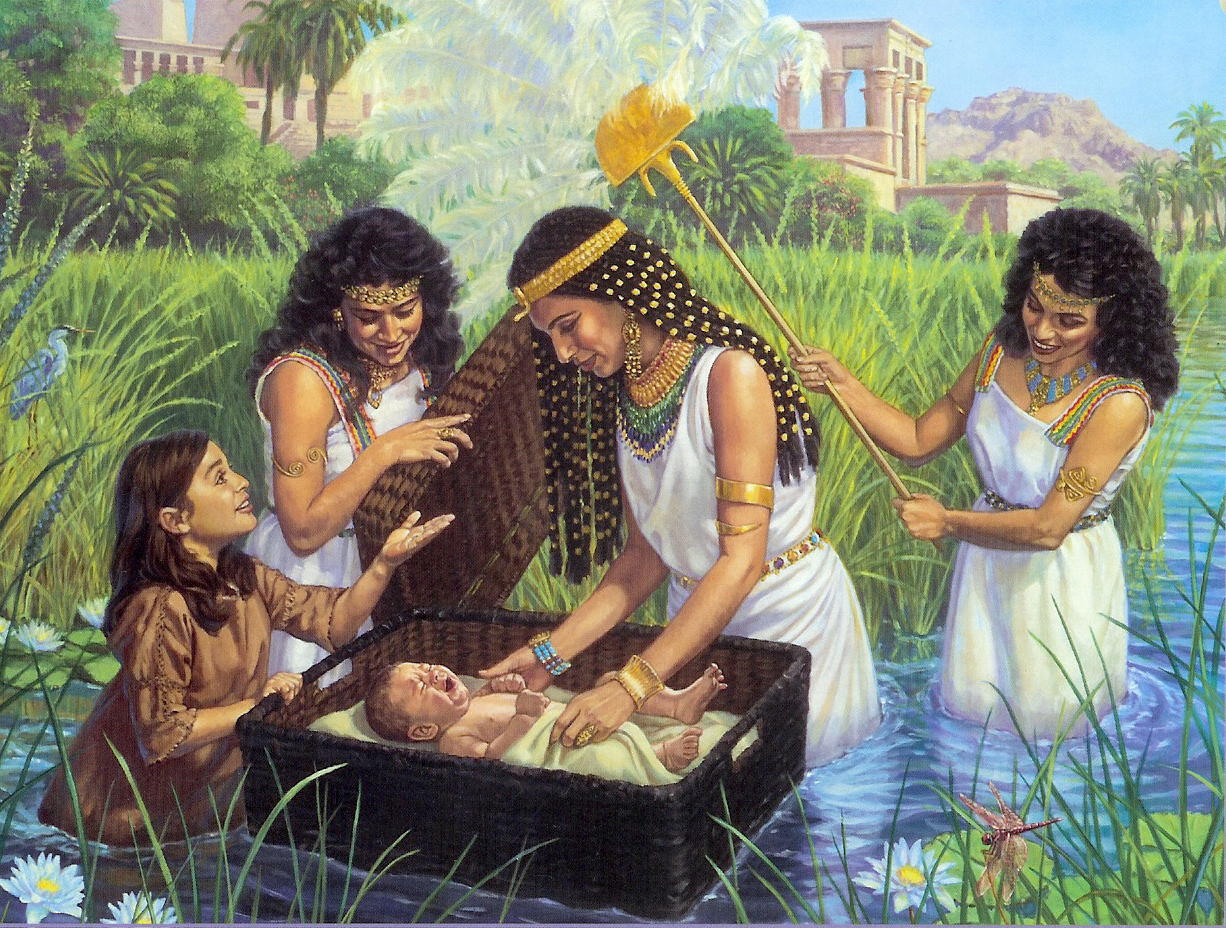Home>Storage Ideas>Storage Baskets>What Do Baskets Symbolize In The Bible


Storage Baskets
What Do Baskets Symbolize In The Bible
Modified: January 20, 2024
Discover the symbolic meaning behind baskets in the Bible. Explore how storage baskets were used to represent abundance, provision, and organization in biblical times.
(Many of the links in this article redirect to a specific reviewed product. Your purchase of these products through affiliate links helps to generate commission for Storables.com, at no extra cost. Learn more)
Introduction
Throughout the Bible, baskets are mentioned numerous times, with symbolic meanings deeply rooted in the history and culture of the ancient Israelites. These humble containers played significant roles in various biblical narratives, carrying spiritual connotations that resonate with both the Old and New Testaments. Understanding the symbolism of baskets in the Bible allows us to gain deeper insight into the teachings and messages conveyed in these sacred texts.
In the Old Testament, baskets were often used for practical purposes such as carrying food, harvesting crops, or collecting offerings. However, they also held symbolic value, representing abundance, provision, and God’s faithfulness. In the New Testament, baskets are associated with miracles, divine provision, and the spreading of the Gospel.
This article will explore the rich symbolism of baskets in the Bible, drawing examples from both the Old and New Testaments. We will examine specific biblical stories where baskets play a significant role and uncover the spiritual meaning attached to these humble containers. By delving deeper into the symbolism of baskets, we can deepen our understanding of the biblical message and apply these lessons to our own lives today.
Key Takeaways:
- Baskets in the Bible symbolize God’s provision, protection, and unity, reminding us to trust in His faithfulness and share generously with others.
- The spiritual meaning of baskets encourages surrender, humility, and growth, emphasizing our interconnectedness and the transformative power of God’s love.
Read more: What Do Mums Symbolize
Baskets in the Old Testament
In the Old Testament, baskets were commonly used for various purposes, including gathering fruits, grains, and offerings. They were woven from materials such as reeds, palm leaves, or branches, and were crafted with skill and precision.
One prominent story involving baskets is the account of Moses’ journey as an infant. To protect him from the order to kill all Hebrew baby boys, Moses’ mother placed him in a basket made of bulrushes and placed it among the reeds of the Nile River. This basket became a vessel of God’s providence, as Moses was discovered by Pharaoh’s daughter and raised in the Egyptian palace. This story highlights the theme of God’s protection and deliverance through a simple basket.
Another example is the story of Joseph, who interpreted Pharaoh’s dreams. In one of the dreams, Pharaoh saw seven beautiful, plump cows being devoured by seven thin and gaunt cows. Likewise, he saw seven healthy ears of grain swallowed up by seven thin and blighted ears. Joseph interpreted these dreams as a warning of seven years of abundance followed by seven years of famine. As part of his wise counsel, Joseph recommended that Pharaoh appoint someone to oversee the gathering and storage of grain during the years of abundance. In preparation for the years of famine, the Egyptians filled large baskets with excess grain to sustain them through the lean times. These baskets became a symbol of God’s provision and wisdom in times of scarcity.
In addition to practical uses, baskets also played a role in religious rituals and offerings. According to Leviticus, a specific type of basket, known as the “basket of firstfruits,” was used to offer the first portion of the harvest to God as an act of gratitude and acknowledgement of His provision. This act recognized that all blessings ultimately come from God and were meant to be shared with others.
The Old Testament’s depiction of baskets conveys the themes of provision, protection, and gratitude. They serve as reminders that God is the ultimate provider, sustaining His people in times of abundance and scarcity. The use of baskets in these narratives demonstrates the importance of trust and reliance on God’s faithfulness, even in the face of adversity.
Baskets in the New Testament
In the New Testament, baskets continued to hold symbolic significance, often associated with miracles, divine provision, and the spreading of the Gospel message.
One of the most well-known stories involving baskets is the feeding of the 5,000. In this miraculous event, Jesus multiplied five loaves of bread and two fish to feed a large crowd. After everyone had eaten and was satisfied, Jesus instructed his disciples to gather the leftovers. The disciples filled twelve baskets with the fragments that remained, symbolizing the abundance and overflowing provision of God. This story highlights the idea that God’s resources are unlimited, and He is capable of meeting all our needs.
Another instance where baskets play a significant role is the conversion of the Apostle Paul. After his encounter with Jesus on the road to Damascus, Paul spent time in Arabia, receiving direct revelation from God. Later, he visited Jerusalem and met with the apostles. However, they were initially skeptical of him due to his previous persecution of Christians. As a sign of acceptance and proof of his transformation, Paul mentions that he spent three years in Arabia and then returned to Damascus. During this time, he was lowered in a basket through a window in the city wall to escape those who sought to harm him. This event symbolizes God’s protection and provision in times of danger, demonstrating that He can use even the simplest and humblest of means to guard and guide His chosen ones.
In addition to these stories, baskets are also mentioned in the context of Jesus’ teachings. In the parable of the mustard seed, Jesus compared the growth of the Kingdom of Heaven to a tiny mustard seed that grows into a large tree, providing shelter and sustenance for birds. He emphasized that even small acts of faith and obedience can result in significant and far-reaching impact, just like a small basket can hold a bountiful harvest.
The New Testament’s portrayal of baskets showcases the supernatural power and provision of God. They serve as reminders that God can work miracles, provide abundantly, and protect His chosen ones in times of adversity. These stories also highlight the importance of faith, obedience, and recognizing the divine hand at work in our lives.
Symbolism of Baskets in the Bible
Baskets hold deep symbolic meanings in the Bible, representing various themes and concepts that are significant in the spiritual realm. Understanding the symbolism of baskets allows us to interpret the lessons and messages conveyed in biblical narratives more profoundly.
One key symbolism associated with baskets is that of provision and abundance. Throughout the Bible, baskets are often filled with food, representing God’s abundant provision for His people. From the manna that sustained the Israelites in the wilderness to the miraculous multiplication of loaves and fishes by Jesus, baskets serve as symbols of God’s faithfulness in meeting the needs of His people. They remind us that when we trust in God, He will abundantly provide for us, both spiritually and physically.
Baskets also symbolize humility and simplicity. Unlike extravagant vessels or ostentatious displays, baskets are humble containers made from basic materials. They remind us of the importance of having a humble and teachable spirit before God. Just as Moses’ basket, crafted from bulrushes, became a vessel used by God for His purposes, we are called to be vessels of humility, ready to be used by God for His glory.
In addition, baskets represent unity and community. In the story of the feeding of the 5,000, the gathering of leftovers in baskets signifies the importance of gathering and sharing resources among believers. It teaches us the significance of generosity and the power of collective effort in meeting the needs of others. Baskets remind us that we are called to be part of a larger community, where each member contributes to the well-being and care of others.
Furthermore, baskets can symbolize spiritual growth and transformation. In the parable of the mustard seed, the image of a small seed growing into a large tree is compared to the Kingdom of Heaven. Likewise, a small basket can hold a bountiful harvest. This symbolizes the potential for growth and transformation that lies within each one of us. Just as a seed grows into a mighty tree, our faith and obedience, no matter how small, can produce significant and impactful results.
Lastly, baskets can represent God’s protection and deliverance. The story of Moses being placed in a basket and saved from certain death illustrates God’s protective hand. Similarly, Paul being lowered in a basket to escape danger showcases God’s miraculous deliverance. Baskets symbolize the assurance that God is our refuge and will provide a way out of challenging situations, even through the most unlikely means.
Understanding the symbolism of baskets in the Bible allows us to delve deeper into the spiritual significance of these seemingly ordinary objects. They serve as reminders of God’s provision, humility, unity, growth, and protection. By recognizing these symbols, we can apply the lessons learned to our own lives and deepen our faith in God’s love and faithfulness.
The Story of Moses and the Basket
The story of Moses and the basket is a well-known account from the Old Testament that exemplifies God’s providence and protection. It is a powerful narrative of faith, hope, and God’s faithfulness in the face of adversity.
The story begins during a time when the Israelites were living as slaves in Egypt. Pharaoh, the ruler of Egypt, had ordered the death of all Hebrew baby boys to control their growing population. In the midst of this harsh decree, a Hebrew woman named Jochebed gave birth to a son. Fearing for his life, she devised a plan to save him.
Jochebed wove a basket out of bulrushes, a type of reed, and coated it with pitch to make it waterproof. With a heavy heart, she placed her baby son in the basket and set it adrift on the Nile River, trusting in God’s protection and guidance.
As the basket floated along the river, it was discovered by Pharaoh’s daughter. Moved with compassion, she recognized the baby as a Hebrew child and decided to adopt him as her own. In a beautiful twist orchestrated by God, Moses, the baby in the basket, grew up in the very palace of the ruler who had ordered his death.
The story of Moses and the basket illustrates several important themes. Firstly, it demonstrates God’s sovereignty and control over all circumstances. Despite the oppressive conditions and the danger facing Hebrew infants, God ensured the preservation of Moses’ life and guided him to the palace where he would eventually play a pivotal role in delivering the Israelites from slavery.
The story also highlights the power of a mother’s love and faith. Jochebed’s act of placing Moses in the basket reflects her trust in God’s plan and her desire to protect her son. Her courage and obedience are a testament to the strength of character and unwavering faith that can exist even in the face of seemingly insurmountable odds.
Furthermore, the story of Moses and the basket serves as a reminder that God can use even the simplest and humblest of means to accomplish His purposes. A small woven basket made of bulrushes became the vessel through which God unfolded His plan for Moses’ life and the deliverance of His chosen people.
The story of Moses and the basket challenges us to trust in God’s sovereignty, even in difficult circumstances. It encourages us to have faith in His provision and protection, knowing that He can work through the most unlikely and ordinary means to bring about His purposes. It also reminds us of the power of a mother’s love and the impact of a single act of obedience in shaping the course of history.
As we reflect on the story of Moses and the basket, may it inspire us to trust in God’s plan for our lives, to have faith in His provision, and to courageously walk in obedience, knowing that He is with us every step of the way.
Baskets in the Bible often symbolize provision, abundance, and the faithfulness of God to provide for His people. They can also represent the concept of being chosen and set apart for a specific purpose.
Read more: What Do Curtains Symbolize
The Story of Paul and the Basket
In the New Testament, the story of Paul and the basket showcases God’s provision and protection in times of danger. This remarkable account highlights the courage and resilience of the Apostle Paul as he navigated challenges and persecution in his mission to spread the Gospel.
After Paul’s conversion on the road to Damascus, he embarked on a transformative journey of faith and ministry. However, his newfound devotion to Christ came at a price. He faced opposition, rejection, and even threats to his life from both Jewish authorities and those who opposed the emerging Christian movement.
One instance where Paul’s life was in grave danger occurred when he visited Damascus for the first time as a converted Christian. The Jews in the city were furious with him and plotted to kill him. In a daring escape, Paul was lowered in a basket through a window in the city wall, allowing him to flee from those seeking to harm him.
This event is mentioned in the New Testament book of Acts:
“Through a window in a basket I was let down from the wall and escaped his hands.” – Acts 9:25
The story of Paul and the basket reveals several significant truths. Firstly, it showcases God’s protection and deliverance in times of imminent danger. Despite the threats against him, Paul was able to escape unharmed through the instrumentality of a simple basket. This reminds us of God’s ability to use seemingly insignificant means to accomplish His purposes and ensure the safety of His chosen ones.
Secondly, the story of Paul and the basket highlights the importance of relying on community and support during times of crisis. It was the believers in Damascus who provided the means for Paul’s escape by lowering him in the basket. This illustrates the power of unity and collective effort in the face of adversity and emphasizes the value of the support and care we can find within the Christian community.
Lastly, Paul’s experience with the basket demonstrates his unwavering commitment and dedication to his mission. Despite the hurdles and dangers he faced, Paul was undeterred in spreading the Gospel message and fulfilling his calling. His willingness to trust in God’s strength and provision enabled him to persevere even in the face of mortal danger.
The story of Paul and the basket serves as a powerful reminder to trust in God’s protection and provision in times of adversity. It encourages us to have faith in His guidance and rely on the support of our fellow believers. Like Paul, we are called to remain steadfast in our mission, even when faced with challenges and opposition.
May the story of Paul and the basket inspire us to trust in God’s faithfulness, step out in courage, and rely on the strength and unity of our Christian community as we navigate the challenges and obstacles in our own lives and missions.
The Significance of Baskets in Biblical Miracles
In the Bible, baskets are often associated with miracles that display God’s supernatural power, provision, and the spreading of His message. These miraculous events provide profound lessons and insights into the significance of baskets in the context of divine intervention.
One notable example of the significance of baskets in biblical miracles is the feeding of the 5,000. In this extraordinary event, Jesus multiplied five loaves of bread and two fish to feed a multitude of people. After everyone had eaten and was satisfied, Jesus instructed his disciples to gather the fragments that remained. The disciples filled twelve baskets with the leftovers, symbolizing the abundance and overflowing provision of God.
The baskets in this miracle signify God’s abundance and generosity in meeting the needs of His people. They remind us that God is not limited by earthly resources or human capabilities. Just as the baskets could contain and preserve an abundance of food, God’s provision is limitless and can exceed our expectations.
In another instance, the Apostle Peter experienced a miraculous intervention through a vision. He saw a large sheet descending from heaven containing all kinds of animals. A voice instructed him to rise, kill, and eat the animals, including those considered unclean under Jewish dietary laws. This vision revealed God’s intention to include Gentiles in the Gospel message and break down barriers of religious exclusivity.
After this vision, Peter visited the house of a Gentile named Cornelius, where he shared the Gospel. As he spoke, the Holy Spirit fell upon Cornelius and his household, confirming God’s acceptance of the Gentiles. This incident demonstrated God’s inclusive love and the breaking of cultural and religious barriers, represented metaphorically by the vision of the sheet resembling a large basket.
The significance of baskets in the context of biblical miracles extends beyond physical provision and includes the spread of the Gospel message. Baskets served as vessels for the collection and distribution of food, and likewise, they represent the spreading of spiritual nourishment and the Good News of God’s salvation.
Throughout the Bible, baskets are often used to carry offerings, firstfruits, and tithes given to God. The act of offering these provisions in the baskets represents surrendering our resources and gifts to God, trusting in His ability to use them for His glory and the benefit of others. Additionally, it signifies our participation in the spreading of His message, just as the disciples participated in distributing the multiplied food.
The significance of baskets in biblical miracles reminds us that God’s intervention goes beyond the immediate provision of physical needs. It extends to the spiritual well-being and fulfillment of His people. The baskets symbolize the abundance, inclusivity, and transformative power of God’s grace and love.
As we reflect on the significance of baskets in biblical miracles, we are encouraged to trust in God’s abundant provision, to participate in the spreading of His message, and to embrace His inclusive love that breaks down barriers and expands our understanding of His powerful work in our lives and in the world.
The Spiritual Meaning of Baskets in the Bible
In addition to their practical and symbolic significance in biblical narratives and miracles, baskets carry a deeper spiritual meaning in the Bible. Understanding the spiritual symbolism of baskets allows us to delve into the profound truths and lessons conveyed in these sacred texts.
One spiritual meaning of baskets is the idea of surrender and dependency on God. Baskets are vessels that hold and carry provisions, symbolizing our need to trust in God as our ultimate provider. Just as a basket cannot fulfill its purpose without being filled, we cannot fully experience God’s blessings and guidance unless we surrender ourselves completely to Him. Baskets remind us to release our worries, fears, and desires into His hands, trusting that He will provide for all our needs according to His perfect plan.
Furthermore, baskets represent the importance of stewardship and sharing. In biblical times, baskets were used to collect offerings, share food, and distribute resources among the community. They symbolize our responsibility to steward the blessings and resources that God has entrusted to us. Baskets remind us of the call to be generous, to share with others, and to use our blessings for the benefit of the community. They signify the interconnectedness of believers and the importance of actively participating in God’s work of love and service.
Baskets also hold significance in the context of humility and simplicity. Unlike ornate vessels or expensive containers, baskets are made of basic materials and reflect a humble craftsmanship. They remind us to cultivate a humble and teachable spirit before God, recognizing that He works through the simplest of means to accomplish His purposes. Baskets encourage us to embrace simplicity, to release our pride and ego, and to surrender ourselves fully to God’s will.
Moreover, baskets symbolize the idea of transformation and growth. In biblical stories, baskets often carry provisions that sustain and nurture life. They represent the spiritual nourishment and growth that we find through our relationship with God. Baskets remind us that through His Word, His presence, and His grace, we are continually being transformed and equipped to fulfill our purpose and grow in faith. They encourage us to seek the sustenance and spiritual nourishment that comes from walking closely with God.
Lastly, baskets hold a spiritual meaning of unity and diversity. In biblical narratives, baskets are often used to gather and distribute resources among the community, emphasizing the importance of shared responsibility and collective effort. Baskets remind us that we are all interconnected as believers, each with unique gifts and contributions to offer. They encourage us to embrace the diversity within the body of Christ and to work together for the advancement of His Kingdom.
The spiritual meaning of baskets in the Bible provides profound insights into our relationship with God and our calling as His followers. They remind us to surrender, to steward our blessings, to embrace humility and simplicity, to seek growth and transformation, and to cherish unity within the community of believers. May we reflect on the symbolism of baskets and allow it to shape our faith, our actions, and our understanding of God’s profound love and provision in our lives.
Conclusion
The symbolism of baskets in the Bible runs deep, encompassing themes of provision, protection, unity, humility, growth, and divine intervention. Through their presence in biblical narratives and miracles, baskets serve as powerful reminders of God’s faithfulness, guidance, and overflowing abundance.
In the Old Testament, baskets are woven into stories of God’s provision and care for His people. From the story of Moses’ journey in a basket to Joseph’s gathering of grain, baskets signify God’s ability to sustain and provide for His children in times of plenty and scarcity. They teach us the importance of trusting in His sovereignty and relying on His provision in all aspects of our lives.
In the New Testament, baskets take on a new significance, representing miraculous events and the spreading of the Gospel. The feeding of the 5,000 highlights God’s supernatural ability to multiply provisions and meet the needs of His people. The story of Paul being lowered in a basket demonstrates God’s protection and deliverance in times of danger. Baskets also symbolize the communal effort and unity within the Christian community to share resources and spread the message of salvation.
Moreover, the spiritual meaning of baskets reminds us of important truths in our faith journey. They call us to surrender our lives and trust in God’s provision, to steward our blessings for the benefit of others, to embrace humility and simplicity, to seek growth and transformation, and to cherish unity within the body of Christ.
As we reflect on the symbolism of baskets in the Bible, may we be inspired to deepen our trust in God’s faithfulness, to share our resources generously, and to embrace a humble and teachable spirit. Let us seek spiritual nourishment and growth in our relationship with God and actively participate in His work of love and service.
May the significance of baskets in the Bible serve as a constant reminder of God’s provision, care, and transformative power in our lives. As we navigate the challenges and blessings that come our way, let us remember that just as a basket can carry a bountiful harvest, we are vessels of God’s love, grace, and purpose in this world.
May we be filled with gratitude, trust, and obedience, knowing that in God’s hands, our lives can be vessels of His miraculous power and instruments for the spreading of His kingdom on earth.
Frequently Asked Questions about What Do Baskets Symbolize In The Bible
Was this page helpful?
At Storables.com, we guarantee accurate and reliable information. Our content, validated by Expert Board Contributors, is crafted following stringent Editorial Policies. We're committed to providing you with well-researched, expert-backed insights for all your informational needs.















0 thoughts on “What Do Baskets Symbolize In The Bible”